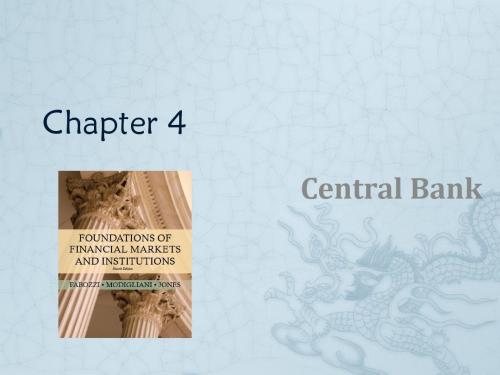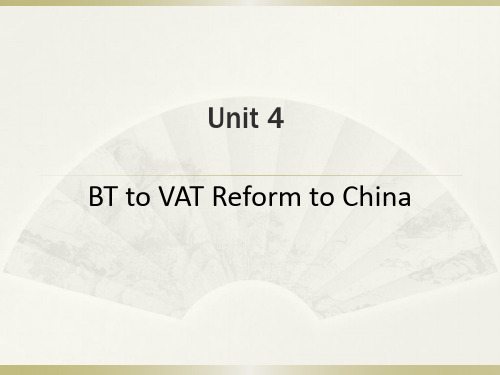金融英语口语教程第4课
- 格式:docx
- 大小:38.02 KB
- 文档页数:3


Unit 4Listen carefully and choose the best answer to the question after each dialog. Scripts & AnswersDialog 1M: Well, you’re back at last from the bank.W: Yes, just now. The manager of the Credit Department said that they will learn about the economic performance of our business from the financial statements submitted to them.M: Exactly. He can make a comparison between the financial statementsof one year with those of the next year. It is particularly helpful in understanding a company’s financia l position.W: I understand that if we want to borrow money from a bank, we shouldprepare accounting reports and submit to the bank our financial statementson all the activities of operating, investing and financing of our company. M: Yes. The manager will read the statements and get the data implied by the accounting reports in order to make decision.Question: What need to be submitted to the bank according to the dialog (B)译文男:啊,你总算从银行回来了。




有关金融的英语口语对话H:Well, the term International Monetary System actually refers to a series of agreementsamong the major governments and their central banks to bring order and stability to theinternational exchange markets.霍:噢,“国际货币制度这一术语实际上是为了维护国际外汇市场的秩序和稳定,一些影响较大的政府和中央银行之间所签定的一系列协定。
The most important, signed in 1944, is called the Bretton Woods Agreemen最为重要的一个协定是1944年签定的布雷顿森林协Then it established the World Bank and the International Monetary Fund.根据该协定建立了世界银行和国际货币基金组织。
S2:Oh, you mean these agreements regulate international exchange rates?学2:那么,您是说由这些协定来管理国际汇率H:Yes. They did until 1971.霍:是的,直到1971年。
S3:What happened in 1971 to change this?学3:什么原因在1971年改变了这一点呢?H:The surplus of dollars abroad from foreign aid,霍:由于外援而造成国外的美元过剩,capital exports and chronic balance of payments deficits forced the U.S. to formally suspendgold convertibility.资本的输出和长期的国际收支逆差迫使美国正式中止了黄金可兑换性,This brought an end to the old Bretton Woods System.致使旧的布雷顿森林体系宣告结束。
金融英语口语教程第4课
The International Monetary Situation (1)
国际货币制度(一)
Situation 4
情景 4
Mary Johnson ,an officer of the First National Bank, is discussing the International Monetary System with one of her businessman clients ,Harold Black.
玛丽·约翰逊,第一国民银行的高级职员,正和她的一位经商的顾客哈罗德·布莱克讨论国际货币制度。
Black:I have been reading a great deal recently about exchange-rate fluctuations ,
布莱克:最近,我读了大量相关外汇汇率浮动、
payment balances ,clean and dirty floats ,and the International Monetary System .
收支平衡、不受限制的和受限制的汇率浮动以及国际货币制度的材料。
While I generally understand the way foreign exchange markets work,I am not sure exactly what the International Monetary System is.
虽然我对于外汇市场的机制有了大概的了解,但是对于什么是国际货币制度这个问题还是不十分清楚。
Johnson:Well,Mr.Black,the term International Monetary System actually refers to a series of agreements among the
major governments and their central banks to bring order and stability to the international exchange markets.
玛丽:噢,布莱克先生,“国际货币制度”这个术语实际上是指为了维护国际外汇市场的秩序和稳定,一些影响较大的政府和中央银行之间所签定的一系列协定。
The most important ,signed in 1944,is called the Bretton Woods Agreement .
最为重要的一个协定是1944年签定的布雷顿森林的协定,
It established the World Bank and the International Monetary Fund.
根据该协定而建立了世界银行和国际货币基金组织。
B:Oh ,so you mean these agreements regulate international exchange rates?
布莱克:那么,您是说由这些协定来管理国际汇率吗?
J:They did until 1971.Up until that time international foreign exchange rates were pegged to fixed values for gold and the U.S.dollar,
玛丽:直到1971年,这些协定确实起着这样的作用。
在当时,国际外汇汇率是以黄金和美元的固定价值来定价的,
which was considered to be the key currency .
黄金和美元被分认为当时的主要通币。
B:What happened in 1971 to change this ?
布莱克:那么,1971年时,什么原因改变了这个点呢?
J:The surplus of dollars abroad from foreign aid,capital exports and chronic balance of payments deficits forced the U.S. to formally suspend gold convertibility .
玛丽:因为外援而造成的国外的美元过剩,资本的输出和长期的国际收支逆差迫使美国正式中止了黄金的可兑换性,
This brought an end to the old Bretton Woods System.
致使旧的布雷顿森林体系宣告结束。